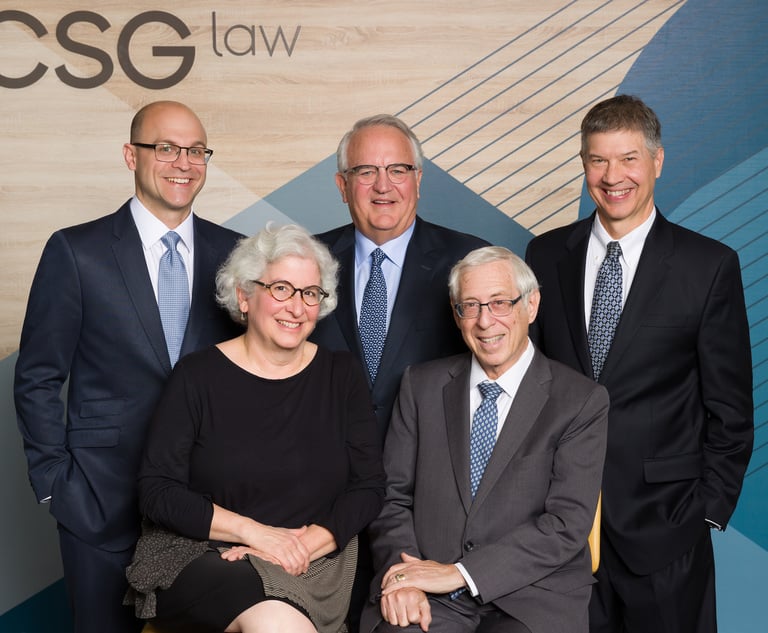 April Katz Israeli of Williams Law Group
April Katz Israeli of Williams Law GroupApril Katz Israeli Sees Mentorship as 'Second Nature'
"For me it is a natural extension of what I do for a living. The mentorship role feels second nature to me and is truly part of all the relationships I develop."
June 10, 2019 at 06:00 PM
3 minute read
April Katz Israeli has been practicing family law for more than two decades. She joined the Williams Law Group in Short Hills in January 2018 and immediately took on the role of mentor, helping colleagues develop strategies that have proven successful and yielded positive client feedback, according to one colleague. She also has helped attorneys deal with business-side matters, including billing issues that they find difficult. Israeli also became deeply involved in the firm's charitable and community endeavors. “A mentor is one who not only teaches and fosters positive outcomes, but also lives by example,” the colleague said. “April promotes professional success and positive development of attorneys in this firm and beyond by her stellar example.”
Is the role of mentor one that you set out to take, or one you happened into?
This is a role that evolved naturally. I am a nurturing person by nature, and find that I instinctively want to motivate and educate people around me.
Why are mentors so important in the legal profession?
I think mentors are critical in the legal profession because there are so many “skills of the trade” that cannot be learned in law school, reading cases or reviewing the court rules. It's the intangible aspects, the subtle nuances that need to be taught, such as how to engage with judges, adversaries and clients, what to say and how to say it, and how to effectively and efficiently manage a file.
Good mentors often have learned from good examples. Who are some people who have mentored you?
I have been very fortunate throughout my life and legal career to have had people take me by the hand (figuratively speaking) and guide me to becoming the best person and attorney I can be. These mentors have been invaluable to me. My late parents (Monis & Sylvia Brafman), my first-year law school property professor, Paula Franzese, Esq., Judge Thomas P. Zampino, J.S.C. (Ret.), my first boss, Bruce Nagel, Esq., and his then-partner, Cathleen McDonough, Esq., former law partner, Mario Gurrieri, Esq., and Allison C. Williams, Esq.
Law is, for many, more than a full-time job. How does one create time for mentorship?
For me it is a natural extension of what I do for a living. The mentorship role feels second nature to me and is truly part of all the relationships I develop. I don't feel the need to create time for mentorship, it's already part of what I do.
How are the business and profession of law changing, and are New Jersey lawyers well-positioned for the future?
The business and profession of law are changing at lightning speed due to the incredible technology available to us. I find it to be a blessing and a curse. A blessing because it creates more efficiency, and a curse because it causes tremendous stress and pressure by making us feel that we have to stay connected 24/7. Part of the art of law is having the time to process thoughts, analyze information and choose the right words. With the speed at which we practice today, we are not always giving ourselves that chance, and we need to.
I think New Jersey lawyers are very well-positioned for the future; we are driven, well informed and always at the forefront of making new law.
This content has been archived. It is available through our partners, LexisNexis® and Bloomberg Law.
To view this content, please continue to their sites.
Not a Lexis Subscriber?
Subscribe Now
Not a Bloomberg Law Subscriber?
Subscribe Now
NOT FOR REPRINT
© 2024 ALM Global, LLC, All Rights Reserved. Request academic re-use from www.copyright.com. All other uses, submit a request to [email protected]. For more information visit Asset & Logo Licensing.
You Might Like
View All
Appellate Div. Follows Fed Reasoning on Recusal for Legislator-Turned-Judge
4 minute read
Chiesa Shahinian Bolsters Corporate Practice With 5 From Newark Boutique
5 minute read
'A Mockery' of Deposition Rules: Walgreens Wins Sanctions Dispute Over Corporate Witness Allegedly Unfamiliar With Company

$113K Sanction Award to Law Firm at Stake: NJ Supreme Court Will Consider 'Unsettled Law' Frivolous Litigation Question
4 minute readTrending Stories
- 1DOJ Asks 5th Circuit to Publish Opinion Upholding Gun Ban for Felon
- 2GEO Group Sued Over 2 Wrongful Deaths
- 3Revenue Up at Homegrown Texas Firms Through Q3, Though Demand Slipped Slightly
- 4Warner Bros. Accused of Misleading Investors on NBA Talks
- 5FTC Settles With Security Firm Over AI Claims Under Agency's Compliance Program
Who Got The Work
Michael G. Bongiorno, Andrew Scott Dulberg and Elizabeth E. Driscoll from Wilmer Cutler Pickering Hale and Dorr have stepped in to represent Symbotic Inc., an A.I.-enabled technology platform that focuses on increasing supply chain efficiency, and other defendants in a pending shareholder derivative lawsuit. The case, filed Oct. 2 in Massachusetts District Court by the Brown Law Firm on behalf of Stephen Austen, accuses certain officers and directors of misleading investors in regard to Symbotic's potential for margin growth by failing to disclose that the company was not equipped to timely deploy its systems or manage expenses through project delays. The case, assigned to U.S. District Judge Nathaniel M. Gorton, is 1:24-cv-12522, Austen v. Cohen et al.
Who Got The Work
Edmund Polubinski and Marie Killmond of Davis Polk & Wardwell have entered appearances for data platform software development company MongoDB and other defendants in a pending shareholder derivative lawsuit. The action, filed Oct. 7 in New York Southern District Court by the Brown Law Firm, accuses the company's directors and/or officers of falsely expressing confidence in the company’s restructuring of its sales incentive plan and downplaying the severity of decreases in its upfront commitments. The case is 1:24-cv-07594, Roy v. Ittycheria et al.
Who Got The Work
Amy O. Bruchs and Kurt F. Ellison of Michael Best & Friedrich have entered appearances for Epic Systems Corp. in a pending employment discrimination lawsuit. The suit was filed Sept. 7 in Wisconsin Western District Court by Levine Eisberner LLC and Siri & Glimstad on behalf of a project manager who claims that he was wrongfully terminated after applying for a religious exemption to the defendant's COVID-19 vaccine mandate. The case, assigned to U.S. Magistrate Judge Anita Marie Boor, is 3:24-cv-00630, Secker, Nathan v. Epic Systems Corporation.
Who Got The Work
David X. Sullivan, Thomas J. Finn and Gregory A. Hall from McCarter & English have entered appearances for Sunrun Installation Services in a pending civil rights lawsuit. The complaint was filed Sept. 4 in Connecticut District Court by attorney Robert M. Berke on behalf of former employee George Edward Steins, who was arrested and charged with employing an unregistered home improvement salesperson. The complaint alleges that had Sunrun informed the Connecticut Department of Consumer Protection that the plaintiff's employment had ended in 2017 and that he no longer held Sunrun's home improvement contractor license, he would not have been hit with charges, which were dismissed in May 2024. The case, assigned to U.S. District Judge Jeffrey A. Meyer, is 3:24-cv-01423, Steins v. Sunrun, Inc. et al.
Who Got The Work
Greenberg Traurig shareholder Joshua L. Raskin has entered an appearance for boohoo.com UK Ltd. in a pending patent infringement lawsuit. The suit, filed Sept. 3 in Texas Eastern District Court by Rozier Hardt McDonough on behalf of Alto Dynamics, asserts five patents related to an online shopping platform. The case, assigned to U.S. District Judge Rodney Gilstrap, is 2:24-cv-00719, Alto Dynamics, LLC v. boohoo.com UK Limited.
Featured Firms
Law Offices of Gary Martin Hays & Associates, P.C.
(470) 294-1674
Law Offices of Mark E. Salomone
(857) 444-6468
Smith & Hassler
(713) 739-1250






